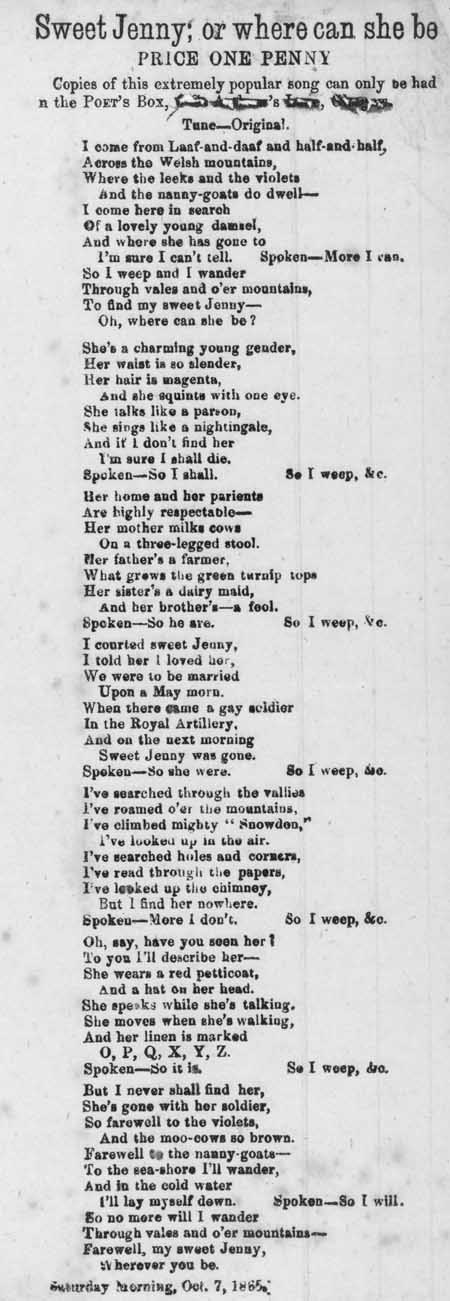Commentary
This ballad begins: 'I come from Laaf-and-daaf and half-and-half, / Across the Welsh mountains, / Where the leeks and the violets / And the nanny-goats do dwell - / I come here in search / Of a lovely young damsel, / And where she has gone to / I'm sure I can't tell.' It was to be sung to an 'Original' tune and was priced at one penny. The broadside was published on Saturday, 7th October 1865 by the Poet's Box in Glasgow. This is a comic song that takes a popular romantic ballad premise, the narrator whose lover has forsaken him or her, and introduces grotesque or nonsensical images that reduce the apparent tragedy of the song to farce. The first verse could almost be taken seriously, but after this the verses become increasingly ridiculous. In verse two, the narrator describes as one of Jenny's most beautiful features the fact that she 'squints with one eye'; in verse five, he searches for her up a chimney; and finally, in verse seven, there is comic pathos when the apparently suicidal narrator bids farewell to 'the moo-cows so brown'.
The Poet?s Box in Glasgow operated from 1849 to 1911. Matthew Leitch was the proprietor at 6 St. Andrew Lane?s, a narrow street on the south side of Gallowgate, from 1850 to 1858. His son William Munsie Leitch worked at the same address from 1859 to 1865 and at varous addresses in London Street until 1911. Many of the broadsides published by the Glasgow Poet?s Box were dated and some carried advertisements, not just for printed items but also for shoe blacking and ?soap for lovers?! Like the other ?boxes? in Dundee and Edinburgh, the Glasgow one sold love songs, sea shanties, parodies and dialogues. It is not clear what the connection between the different Poet?s Boxes were. They almost certainly sold each other?s sheets. It is known that John Sanderson in Edinburgh often wrote to the Leitches in Glasgow for songs and that later his brother Charles obtained copies of songs from the Dundee Poet?s Box. There was also a Poet?s Box in Belfast from 1846 to 1856 at the address of the printer James Moore, and one in Paisley in the early 1850s owned by William Anderson.
Early ballads were dramatic or humorous narrative songs derived from folk culture that predated printing. Originally perpetuated by word of mouth, many ballads survive because they were recorded on broadsides. Musical notation was rarely printed, as tunes were usually established favourites. The term 'ballad' eventually applied more broadly to any kind of topical or popular verse.
View Transcription | Download PDF Facsimile
|
 |
Date of publication:
1865 shelfmark: L.C.1269(157b)
 View larger image
View larger image
|


